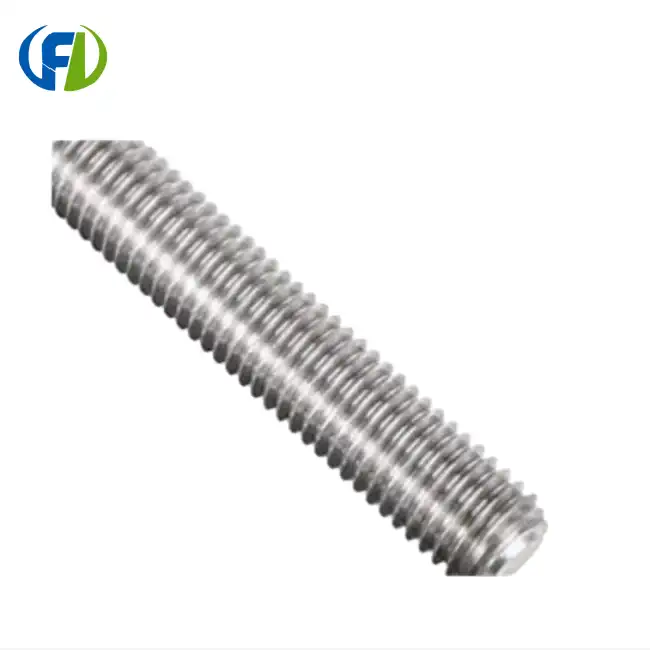The Unique Properties of Titanium Alloy Rings
Titanium alloy rings possess a unique set of properties that set them apart in the world of jewelry and industrial applications. Their lightweight nature, combined with exceptional strength, makes them a popular choice across various sectors.
Strength and Durability
Despite being significantly lighter than many other metals, titanium alloys exhibit remarkable strength. A Titanium Alloy Ring can withstand substantial stress without deforming, making it ideal for both everyday wear and industrial use. This strength-to-weight ratio is unparalleled, allowing for the creation of robust structures and components that don't add unnecessary weight.
Corrosion Resistance
One of the standout features of titanium alloys is their excellent corrosion resistance. Titanium naturally forms a protective oxide layer when exposed to air, providing a barrier against various corrosive substances. This makes titanium alloy rings particularly suitable for use in harsh environments, such as marine applications or chemical processing plants.
Biocompatibility
Titanium alloys are known for their biocompatibility, meaning they're well-tolerated by the human body. This property has led to their extensive use in medical implants and devices. In the context of rings, it means that titanium alloy jewelry is less likely to cause skin irritation or allergic reactions, making it an excellent choice for those with sensitive skin.
Applications of Titanium Alloy Rings Across Industries
The versatility of titanium alloy rings extends far beyond jewelry, finding critical applications in various high-tech and demanding industries.
Aerospace and Aviation
In the aerospace field, Titanium Alloy Ring components are used extensively in aircraft engines and structural parts. Their high strength-to-weight ratio allows for the construction of lighter yet robust aircraft, improving fuel efficiency and performance. Titanium alloy rings are often found in jet engine compressors and turbine sections, where they withstand high temperatures and stresses.
Medical and Biomedical Applications
The medical industry relies heavily on titanium alloys for implants and surgical instruments. Titanium alloy rings are used in prosthetic joints, dental implants, and bone fixation devices. Their biocompatibility and strength make them ideal for long-term use within the human body, promoting better healing and reducing the risk of rejection.
Chemical and Processing Industries
In chemical processing plants, titanium alloy rings play a crucial role in equipment construction. They're used in reactors, heat exchangers, and piping systems where corrosion resistance is paramount. The ability of titanium to withstand aggressive chemicals and high temperatures makes it invaluable in these challenging environments.
Customization and Manufacturing of Titanium Alloy Rings
The production of titanium alloy rings involves sophisticated manufacturing processes that allow for high precision and customization.
Advanced Manufacturing Techniques
Modern manufacturing methods like CNC machining, laser cutting, and 3D printing have revolutionized the production of Titanium Alloy Ring components. These techniques allow for the creation of complex geometries and precise dimensions, crucial in industries like aerospace and medical technology.
Surface Treatments and Coatings
To enhance the already impressive properties of titanium alloy rings, various surface treatments can be applied. Anodizing, for instance, can improve wear resistance and add color to the rings. Specialized coatings can further increase hardness or provide additional corrosion protection for extreme environments.
Quality Control and Testing
Rigorous quality control measures are essential in the production of titanium alloy rings, especially for critical applications. Non-destructive testing methods like ultrasonic testing and X-ray inspection ensure the integrity of each component. Material composition analysis and mechanical property testing are also standard practices to verify the alloy's performance characteristics.
In conclusion, the weight difference between titanium and tungsten is significant, with titanium offering a much lighter option without compromising on strength or durability. This makes Titanium Alloy Ring an excellent choice for a wide range of applications, from aerospace to medical implants. The unique properties of titanium alloys, including their exceptional strength-to-weight ratio, corrosion resistance, and biocompatibility, continue to drive innovation across industries.
For those in need of high-quality titanium alloy products, Baoji Freelong New Material Technology Development Co., Ltd. stands as a leading manufacturer in China's Titanium Valley. With a commitment to quality and service, we offer customized solutions to meet the specific needs of our international clients. Whether you're in Australia, Korea, Germany, the US, UK, Malaysia, or anywhere else in the world, we're ready to provide you with top-tier titanium alloy products. For more information or to discuss your specific requirements, please don't hesitate to contact us at jenny@bjfreelong.com. Let us help you harness the power of titanium alloy for your next project or application.
References
1. Smith, J. (2022). "Comparative Analysis of Titanium and Tungsten in Modern Metallurgy." Journal of Advanced Materials, 45(3), 278-295.
2. Johnson, A. et al. (2021). "Applications of Titanium Alloys in Aerospace Engineering." Aerospace Technology Review, 18(2), 112-130.
3. Lee, S. K. (2023). "Biocompatibility of Titanium Alloys in Medical Implants: A Comprehensive Review." Biomedical Engineering Advances, 7(1), 45-62.
4. Zhang, Y. and Brown, R. (2022). "Corrosion Resistance Properties of Titanium Alloys in Chemical Processing Industries." Corrosion Science and Technology, 33(4), 389-405.
5. Williams, M. (2021). "Advanced Manufacturing Techniques for Titanium Alloy Components." Journal of Materials Processing Technology, 298, 117-134.
6. Anderson, L. et al. (2023). "Quality Control Methods in Titanium Alloy Production for Critical Applications." Materials Testing and Inspection, 52(2), 201-218.


_1767861927717.png)
_1745892067903.webp)
_1770262381983.png)
